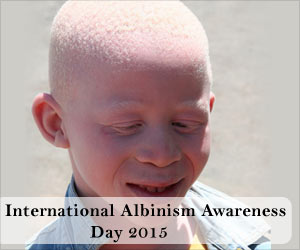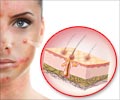- International Albinism Awareness Day (IAAD) is celebrated on 13th June every year
- It aims to generate awareness about the health and social challenges faced by people with albinism
- Greater public awareness will ensure equal rights so that they can live with dignity, without fear of discrimination, prejudice, and persecution
Read More..
History of International Albinism Awareness Day
The International Albinism Awareness Day was established by the United Nations (UN). On 18th December 2014, the UN General Assembly adopted a resolution that proclaimed 13th June as International Albinism Awareness Day. This historic resolution brought albinism on the global stage. As a result, the first International Albinism Awareness Day was celebrated on 13th June 2015. Since then, the annual celebrations have progressively gathered momentum and have gone from strength-to-strength, reaching more and more people with each passing year. The 5th edition of the celebrations is taking place on Thursday 13th June 2019.How is International Albinism Awareness Day Celebrated?
International Albinism Awareness Day is celebrated across the globe through numerous events and activities, some of which are briefly highlighted below:- United Nation’s Event: This is a major event that will take place on 13th June 2019 at the UN Headquarters in New York, USA.
- Social Media Campaigns: Social media is a very powerful tool in the 21st century and is especially popular among the new generation. In order to show solidarity for people living with albinism, the UN recommends using the following hashtags:#stillstrong #iaad #iaad2019 #AlbinismDay #standupforhumanrights.
- Real Life Stories: Real-life stories are very important since they put a ‘human face’ to albinism that people can relate to.
- IAAD Ambassadors: The role of ambassadors is instrumental for spreading awareness about albinism and bringing the global health community’s attention to the challenges faced by people living with albinism
- Films & Documentaries: These are very powerful ways of communicating the message about the predicaments of people with albinism to the global community. For example, the documentary “In the Shadow of the Sun” directed by Harry Freeland is an excellent example. This documentary, released in 2012, follows the dreams of two people with albinism in the face of great adversities, including prejudice and persecution
- Fundraising Events: There’s a wide variety of events and activities that can be organized to raise funds for people with albinism.
- Concerts & Musical Events: Concerts, dance, and other musical performances are organized in many countries on the occasion of International Albinism Awareness Day.
- Photo Exhibitions: Exhibitions of photographs depicting the ground realities of people living with albinism and the atrocities committed on them will raise awareness and help to convince decision-makers and policymakers to bring about positive policy changes through albino-friendly legislations
- TV & Radio Shows: Airing programs on TV and radio, focusing on the theme of albinism are very effective ways of communicating the message to the public.
- Marches & Walks: Marches and walks are organized in many parts of the world on the occasion of International Albinism Awareness Day. For example, a celebratory march is being organized this year in the city of Manzini in Swaziland (Eswatini) in southern Africa to mark the occasion
- Health Fairs: These are very effective for raising awareness about albinism and at the same time, very entertaining for the people.
Albinism: Facts & Figures
- The term ‘albinism’ dates back to the early 19th century and is originally derived from the Latin word ‘albus’ (‘white’)
- 1 in 20,000 people in North America and Europe have albinism
- 1 in 5,000 is the average prevalence of albinism in Africa
- 100,000 to 200,000 cases of albinism have been reported from India
- In 2018, six albino women survivors of attacks and mutilation climbed Mount Kilimanjaro to raise awareness about the rights of people with albinism
- People with albinism are often stigmatized, face discrimination, and exposed to violence
- There is no cure for albinism
Albinism: Myths & Truths
Myths | Truths |
Albinism is contagious | Albinism is a genetic disorder and can’t be transmitted from person-to-person and hence, not contagious |
Albinism is a curse or punishment due to bad deeds in the past | The cause of albinism is well established scientifically. It has nothing to do with curses or punishments for past wrongdoings |
People with albinism are less intelligent | Albinism occurs due to the absence of the pigment melanin in the skin, hair and eyes. Absence of melanin in the eyes can impair vision, leading to difficulty in reading, but doesn’t affect intelligence |
Albinism only affects the appearance of the person | Although appearance is affected due to the absence of melanin in the skin, it also affects vision due to the same reason. Hence, it doesn’t just affect the appearance |
People with albinism can’t go outside in the daytime | People with albinism can go outside during the day, provided they have adequate sun-protection |
Social Challenges of People with Albinism
Albinism is widely misunderstood by society. Throughout the world, people with albinism, especially children, face bullying, mockery, prejudice, abuse, and even violence because of stereotypes based on the color of their skin. This may force them to drop out of school. The problem is compounded by widespread social rejection and marginalization, which can result in unemployment, isolation, and life-long poverty.Moreover, violence against albinos is another major social issue. Over 700 attacks and killings of people with albinism have been reported from 28 countries in Sub-Saharan Africa since 2010. Violence against people living with albinism often arises from ignorance, ingrained stigma, poverty, and false belief in witchcraft practices.
Interestingly, in some parts of Sub-Saharan Africa, people with albinism are considered to be ghost spirits or phantoms, called“zeru zeru” in the Swahili language. In India, there have been reports of albino babies being abandoned as they are considered to be inauspicious.
How Can the Plight of People with Albinism be Improved?
The plight of people living with albinism can only be improved through concerted efforts at the global level. The International Albinism Awareness Day provides an ideal opportunity to raise the topic of albinism on the global health agenda.Some of the ways of improving the lives of people with albinism are briefly highlighted below:
- Education: Quality education with life-skills should be provided so that people with albinism have better employment opportunities to live with dignity. Moreover, stepping-up education will help to counteract ignorance about albinism and create awareness about the condition
- Advocacy: Advocacy efforts are very effective in giving an international voice to the concerns of people with albinism and contributing to the protection of their human rights
- Healthcare: People with albinism frequently cannot access adequate healthcare services due to discrimination and other factors. This underscores the importance of access and equity, so that everyone can have access to quality healthcare, irrespective of caste, creed, physical appearance (as in albinism), educational attainments, and social standing
- Networking: Establishing effective networks, groups, and associations will facilitate the promotion of the rights of people with albinism and help those in need of protection against violence
- Legislations: Passing laws and regulations are effective ways of fighting corruption. Good legislation will help to ensure the protection of people with albinism against marginalization, discrimination, abduction, mutilation, and killing
- Law Implementation: Adequate training and support should be provided to prosecutors, magistrates, and judges so that they can provide justice and legal protection for albino victims. It should also be ensured that the police are responsive to threats on people with albinism
- Empowerment: People with albinism should be given opportunities to occupy key public positions with decision making powers. This will help reduce stigma and promote visibility and inclusion of people with albinism in the society
- Stigma & Discrimination: People with albinism face severe stigma and discrimination in many parts of the globe, especially in Africa. Therefore, there is a need to fight stigmatization and discrimination to ensure that the victims have access to justice, care, and redressal
- Myths & Superstitions: There is an urgent need to rectify myths and misconceptions about albinism, as well as combat harmful superstitions and beliefs about the condition, which are often associated with witchcraft. These are primarily prevalent in African countries
So, on International Albinism Awareness Day, let’s make extra efforts to fight for the rights of people with albinism, so that they can live free from discrimination, deprivation, prejudice, and fear.
References:
- International Albinism Awareness Day 13 June - The United Nations - (https://www.un.org/en/events/albinismday/index.shtml)
- Meet the Champions of the Albinism Cause - United Nations Human Rights Office of the High Commissioner - (https://albinism.ohchr.org/)
- June 13 International Albinism Awareness Day: Still Standing Strong - National Organization for Albinism and Hypopigmentation (NOAH) - (https://www.albinism.org/iaad/#social)
- Raising Awareness about Albinism - Western Cape Government, South Africa - (https://www.westerncape.gov.za/general-publication/raising-awareness-about-albinism)
- International Albinism Awareness Day 2019 - Still Standing Strong - (http://www.minervaonline.org/the-international-albinism-awareness-day-2019/)
Source-Medindia











